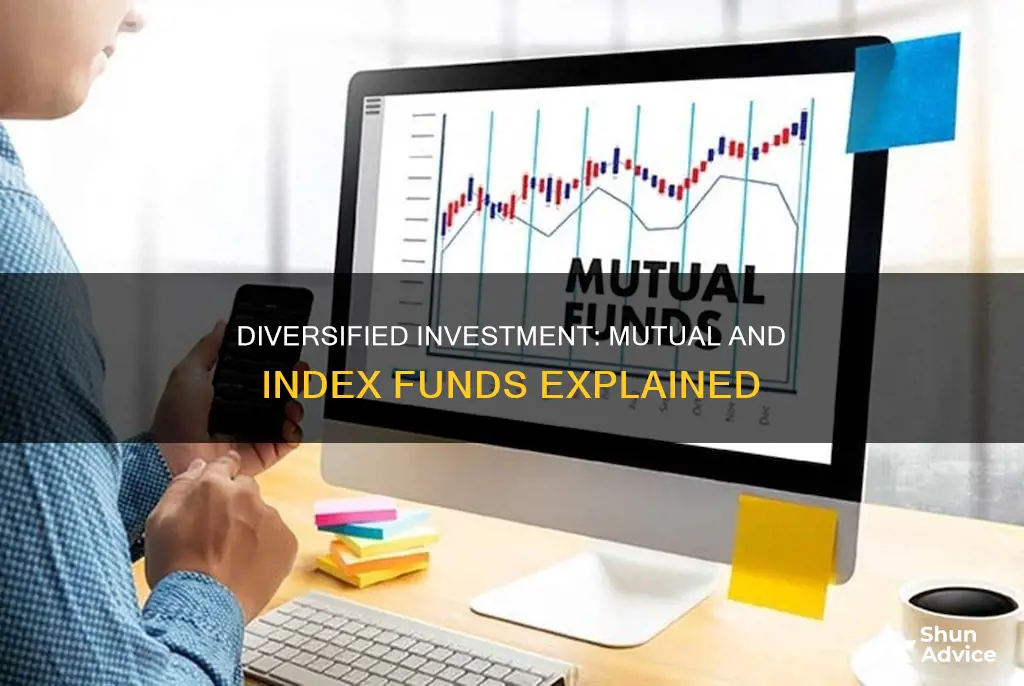
Index funds and mutual funds are investment vehicles that pool money from multiple investors to purchase a diversified portfolio of stocks, bonds, or other securities. Index funds are a type of mutual fund or exchange-traded fund (ETF) that tracks the performance of a market index, such as the S&P 500 or the Dow Jones Industrial Average. They are designed to mirror the performance of a specific index by holding a diversified portfolio of securities weighted to represent the index. Mutual funds, on the other hand, can be actively managed, meaning professional managers actively trade securities to try and outperform the market. Index funds are passively managed, and their primary goal is to replicate the performance of the index they track.
| Characteristics | Values |
|---|---|
| Type of fund | Mutual or exchange-traded fund (ETF) |
| Investment strategy | Passive |
| Investment approach | Long-term |
| Investment objective | Diversification, lower fees, broad market exposure, lower risk |
| Management style | Passive |
| Management fees | Lower |
| Investment risk | Lower |
| Tax efficiency | Higher |
| Performance | Outperform actively managed funds |
What You'll Learn

Index funds vs. mutual funds
Index funds and mutual funds are both investment options that allow investors to diversify their portfolios. However, there are some key differences between the two.
Management Style
Index funds are passively managed, meaning they aim to replicate the performance of a specific market index, such as the S&P 500. The fund's portfolio only changes when the benchmark index it tracks changes. On the other hand, mutual funds are actively managed by a fund manager or management team who makes investment decisions based on the fund's goals. They have the freedom to invest across multiple indexes and asset types.
Investment Objective
The primary objective of index funds is to mirror the performance of the underlying index. In contrast, the goal of actively managed mutual funds is to outperform the index and achieve higher returns by investing in securities that are expected to beat the market.
Fees and Costs
Index funds typically have lower fees and costs compared to actively managed mutual funds. Since index funds are passively managed, they do not require a large staff of investment managers, analysts, and traders. As a result, they have lower expense ratios, which are fees charged as a percentage of the assets under management. Actively managed mutual funds, on the other hand, tend to have higher expense ratios due to the cost of managing and operating the fund.
Performance and Risk
Index funds have historically performed well over the long term, often outperforming actively managed funds, especially after accounting for fees and expenses. However, they may lack the flexibility to pivot away from a declining market. Mutual funds, on the other hand, may have the potential for higher returns in the short term but are also exposed to the risk of underperforming the market.
Suitability
Index funds are often considered a good option for long-term investors who want a simple, low-cost, and diversified investment strategy. They are also suitable for beginners as they are easy to understand and have lower expense ratios. Mutual funds, on the other hand, may be more suitable for investors who want the potential upside of actively managed funds and are willing to take on more risk.
Fidelity Blue Chip Growth Fund: A Smart Investment Strategy
You may want to see also

The benefits of diversification
Diversification is a key investment strategy for reducing systematic risk in a portfolio while maintaining expected returns. It is the practice of spreading investments across different asset classes, industries, and geographic regions to reduce the overall risk of an investment portfolio.
Protects Against Losses
Diversification attempts to protect an investor's portfolio against losses. This is especially important for older investors who need to preserve wealth toward the end of their careers, as well as retirees or individuals approaching retirement who may no longer have a stable income.
Increases Risk-Adjusted Returns
Diversification is thought to increase the risk-adjusted returns of a portfolio. This means investors earn greater returns when factoring in the risk they are taking.
Creates Better Opportunities
Diversifying can lead to better investment opportunities. For example, investing in a streaming service to diversify away from transportation companies could result in the streaming company announcing a major partnership and investment in content, positively impacting the portfolio.
Makes Investing More Enjoyable
For some, diversifying can make investing more fun and enjoyable. Instead of holding all investments within a narrow group, diversifying means researching new industries, comparing companies, and emotionally buying into different industries.
Reduces Volatility
Diversification can help an individual investor manage risk and reduce the volatility of an asset's price movements. A diversified portfolio has a lower correlation, which can protect against extreme declines.
Provides Stability
A diversified portfolio may underperform relative to a winning investment, but it can provide stability and help investors sleep at night.
Understanding Investment Funds: Making Money Work Harder
You may want to see also

Index funds and market exposure
Index funds are a type of mutual or exchange-traded fund (ETF) that tracks the performance of a market index, such as the S&P 500, by holding the same stocks or bonds or a representative sample of them. They are defined as investments that mirror the performance of benchmarks like the S&P 500 by mimicking their makeup.
Index funds are designed to be a passive investment strategy, meaning they don't actively pick securities or time the market. Instead, they aim to replicate the performance of a specific market index. This makes them ideal for long-term investing, such as retirement accounts.
Market Exposure
Index funds provide broad market exposure and diversification across various sectors and asset classes according to their underlying index. The broader the index fund, the better it is at minimising tracking errors, which is the difference between the fund's performance and the target index.
For example, the S&P 500 index funds, the most popular and oldest such funds in the U.S., mimic the moves of the stocks in the S&P 500, which covers about 80% of all U.S. equities by market cap. Other major indexes tracked by index funds include the Nasdaq Composite Index, the Bloomberg U.S. Aggregate Bond Index, and the Dow Jones Industrial Average.
Index funds are available across a variety of asset classes, allowing investors to buy funds that focus on companies with small, medium, or large capital values, or specific sectors like technology or energy.
Benefits of Index Funds
Index funds have become a popular investment choice due to their low costs, diversification benefits, and consistent performance. Here are some key benefits:
- Lower costs and fees: Index funds typically have lower expense ratios because they are passively managed, meaning they don't require research analysts or active trading strategies.
- Market representation: Index funds aim to mirror the performance of a specific index, offering broad market exposure and diversification.
- Transparency: The holdings of an index fund are well-known and easily accessible on investing platforms.
- Historical performance: Over the long term, index funds have often outperformed actively managed funds, especially after accounting for fees and expenses.
- Tax efficiency: Lower turnover rates in index funds result in fewer capital gains distributions, making them more tax-efficient.
Drawbacks of Index Funds
Despite their popularity, index funds also have some drawbacks to consider:
- Lack of flexibility: Index funds are designed to mirror a specific market, so they decline in value when the market does and cannot pivot to take advantage of market shifts.
- Inability to avoid weak investments: Index funds automatically include all the securities in an index, which may include overvalued or fundamentally weak companies.
- Market-cap weighting: Index funds with higher market capitalizations can be too heavily influenced by the performance of a few large companies, magnifying risks if these companies underperform.
Choosing an Index Fund
When selecting an index fund to invest in, there are several factors to consider:
- Target market segment: Choose an index fund that aligns with your investment goals, whether it's tracking the entire U.S. stock market or focusing on specific sectors, industries, or company sizes.
- Expense ratio: Compare the expense ratios, which are the annual management fees collected by the fund managers. Lower expense ratios mean more of your investment returns stay with you.
- Minimum required investment: Some index funds have minimum investments, while others, like ETF index funds, can be purchased for the cost of a single share.
- Benchmark tracking performance: Evaluate how closely the index fund tracks its underlying index. The best index funds have very high correlations with their benchmark indexes.
Final Thoughts
Index funds are a great option for investors seeking low-cost, diversified, and passive investments. They are less risky than individual stocks and can provide solid returns over the long term. However, it's important to consider the potential drawbacks and choose an index fund that aligns with your investment goals and risk tolerance.
International Fund Investment: Strategies for Global Portfolio Success
You may want to see also

Index funds and tax efficiency
Index funds are a type of investment fund that tracks the performance of a market index, such as the S&P 500, by holding the same stocks or bonds or a representative sample of them. They are passively managed and use a long-term investment strategy without actively picking securities or timing the market. Due to their passive nature, index funds have lower fees and expense ratios than actively managed funds. They are also more tax-efficient than actively managed funds because they generate fewer capital gains distributions, which are taxed at the long-term capital gains rate.
Index funds are considered tax-efficient for a couple of reasons. Firstly, because index funds simply replicate the holdings of an index, they don't trade in and out of securities as frequently as an active fund. The constant buying and selling by active fund managers tend to produce taxable gains, often in the form of short-term gains taxed at a higher rate. Secondly, since index funds have to buy new lots of securities in the index every time investors put money into the fund, the fund manager has flexibility in choosing which lots to sell and can select those with the lowest tax implications. Additionally, index funds will only sell their complete holdings of a specific security if the index itself removes the security, which is advantageous for investors as such sales can result in large capital gains.
The tax efficiency of index funds can be further enhanced by investing in exchange-traded funds (ETFs). ETFs are traded on exchanges like individual stocks, providing intraday trading flexibility. They also have a unique mechanism for buying and selling, using creation units that allow for the collective purchase and sale of assets in the fund. This means that ETFs typically don't generate the capital gains distributions that mutual funds do, further reducing the tax burden.
When considering the tax efficiency of index funds, it is important to remember that all types of income, including capital gains, dividends, and interest, are generally subject to taxation. However, there are some exemptions, such as Treasury and municipal securities, which are tax-exempt. Additionally, investments held in retirement accounts may have tax advantages.
In summary, index funds are considered tax-efficient due to their passive nature, which results in lower trading activity and, consequently, fewer taxable events. This, coupled with the flexibility in choosing lots to sell and the absence of complete holdings sales, makes index funds a more tax-efficient option compared to actively managed funds. The tax efficiency of index funds can be further improved by investing in ETFs, which have additional tax benefits due to their unique structure and trading mechanism. Nonetheless, it is important to carefully consider the tax implications of any investment and seek professional advice when needed.
Retirement Fund: Invest Now for a Comfortable Future
You may want to see also

The risks of index funds
Index funds are a type of mutual or exchange-traded fund (ETF) that tracks the performance of a market index, such as the S&P 500, by holding the same stocks or bonds or a representative sample of them. They are a popular investment choice due to their broad diversification, low fees, and passive management. However, as with any investment, there are risks involved in index funds. Here are some key risks associated with index funds:
Lack of Flexibility
Index funds have less flexibility than actively managed funds as they are designed to mirror the performance of a specific market index. This means that they cannot pivot away or react to adverse market conditions when the market shifts. The fund manager of an index fund cannot buy and sell securities at their discretion, which may result in a lack of flexibility to respond to price declines in the securities within the index.
Tracking Errors
Tracking errors occur when an index fund does not perfectly track its benchmark index. This can happen when a fund only invests in a sampling of the securities in the market index, causing its performance to deviate from the index. Tracking errors can lead to a difference in returns between the fund and its target index.
Underperformance
Index funds may underperform their benchmark index due to various factors, including fees, expenses, and trading costs associated with the fund. The higher the expense ratios, the more likely the fund is to underperform as a higher proportion of returns are used to cover these costs. Additionally, in prolonged downtrends, index funds can perform poorly in line with the broader market, resulting in underperformance compared to actively managed funds.
Market Risk
Index funds are subject to the same general risks as the securities in the index they track. This includes market risk, where the overall market experiences a downturn. While index funds are well-diversified, they cannot protect against a broad market decline, and investors with a short investment horizon may lose money if they are unable to wait for a recovery.
Concentration Risk
Index funds that use market-cap weighting, where companies with higher market capitalizations have a larger influence on the fund's performance, can lead to concentration risk. This means that a few large companies can dominate the fund, magnifying the risks if these companies underperform.
In summary, while index funds offer broad diversification and other benefits, investors should be aware of the potential risks involved. These risks include a lack of flexibility, tracking errors, underperformance due to fees and expenses, market risk, and concentration risk. It is important for investors to carefully consider these risks and conduct thorough research before investing in index funds.
Digital Access Fund: A Guide to Investing Wisely
You may want to see also
Frequently asked questions
A diversified fund is an investment fund that is invested across multiple sectors, assets, and/or geographic regions. Index funds are a type of mutual or exchange-traded fund (ETF) that tracks the performance of a market index, such as the S&P 500, by holding the same stocks or bonds. Index funds are considered a form of diversification as they allow investors to gain exposure to a broad range of stocks or bonds that mimic a specific benchmark index.
Diversified investment funds offer a lower-risk strategy for investors as they reduce the impact of idiosyncratic events in one area on an entire portfolio. They also provide a simple, low-cost way to gain exposure to a broad range of stocks or bonds, making them suitable for beginners as well as expert investors. Additionally, diversified investment funds often have lower fees compared to actively managed funds.
Some examples of diversified investment mutual or index funds include the Vanguard 500 Index Fund, the Fidelity Nasdaq Composite Index Fund, and the Vanguard Total Stock Market Index Fund. These funds track broad market indices such as the S&P 500, Nasdaq Composite Index, and the Wilshire 5000 Total Market Index, respectively.







